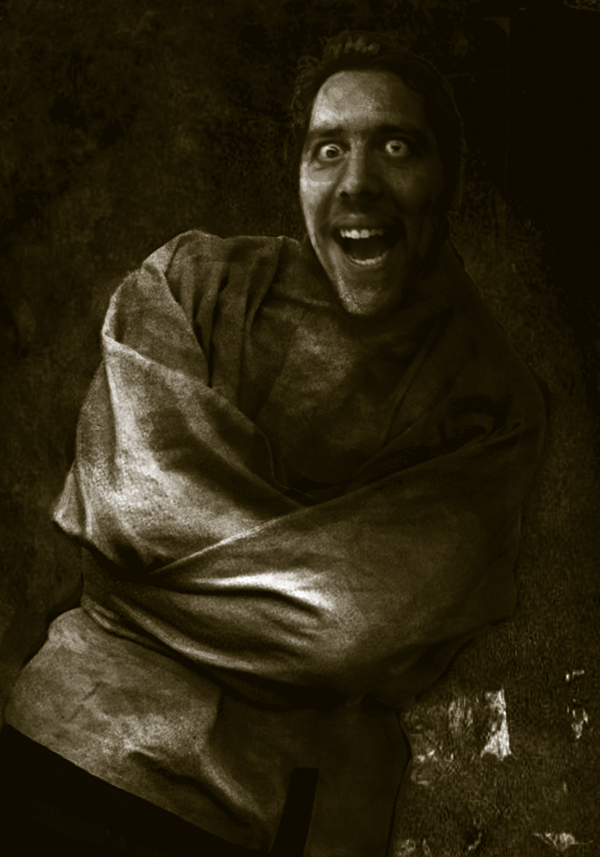News, Trail of Cthulhu
My Sanity Is False! Or How I Learned To Stop Worrying And Love Cthulhu

by Tony Williams
(you can download a crib sheet here for this variant rule).
Here is a suggested rule variant for Trail of Cthulhu to make the dance towards insanity more peripatetic. I wanted to bring the sense of teetering over the abyss of insanity more to the fore. One false step and your investigator would plunge down into mental ruin, but by increasing the opportunities to pull back a little now and then, your doomed hero might be temporarily saved from the asylum for the time being.
Thinking about it, I realised that maybe False Sanity was the way to achieve this, with the added bonus of getting False Sanity used more within the game. This meant I had to make False Sanity easier to obtain, but also easier to lose more often, in order to model the sense of “one step back, two steps forward” towards the precipice.
In standard Trail of Cthulhu there are currently two methods for regaining lost Sanity rating – the three session Ongoing Psychoanalysis process, and the Denial method at the very end of a scenario. Under this rule variant both these methods now only provide False Sanity. There is also the Pulp rule of Defeating the Mythos for regaining just pool points of Sanity but, under this variant, this method is not affected because… it’s a Pulp rule after all.
So, under this new rule, any Sanity rating regained from Denial or Ongoing Psychoanalysis is false. An investigator who began Ongoing Psychoanalysis with a Sanity rating of 4 who finished the three sessions successfully would gain 3 rating and pool points of False Sanity as per the standard Trail of Cthulhu rule of “half the amount of what they had lost” (assuming they originally had an undamaged rating of 10 i.e. half of 10-4). So they would now be on a Sanity rating of 7 (4 plus the 3 gained from the Psychoanalysis sessions) but this should now be noted on their character sheet as:
- Sanity Rating: 7
- Of Which Is False: 3
- Sanity Pool Points: 7
If the same investigator went through the Denial process at the end of an adventure they would gain 1 Sanity rating and pool point (as per the standard Trail of Cthulhu rule) but this is now false under this rule variant so their sheet would look like:
- Sanity Rating: 5
- Of Which Is False: 1
- Sanity Pool Points: 5
Note that the usual rule of “Sanity rating cannot exceed 10 minus Cthulhu Mythos rating” still applies under this new rule so adjust any False Sanity gains downwards, if necessary, to keep within this limit.
Here’s where the new rule really kicks in – any time an investigator with False Sanity loses Sanity or Stability their False Sanity is also threatened.
When an investigator with False Sanity loses Stability pool points they have to roll a d6. If they don’t roll over their current level of False Sanity (in the first example above they have to roll over 3, in the second example over 1) then the loss of Stability has somehow brought to the fore something hideous about the Mythos they had buried in their subconscious and they lose 1 rating of False Sanity (and thus 1 pool point as well). So, for the two examples above, their sheets would now read:
- Sanity Rating: 6
- Of Which Is False: 2
- Sanity Pool Points: 6
- Sanity Rating: 4
- Of Which Is False: 0
- Sanity Pool Points: 4
Note that the 2nd example investigator now has no False Sanity remaining and would not be liable for any further False Sanity losses if they lose further Stability pool points (unless they gain some more False Sanity in the future).
Whenever an investigator with False Sanity loses just pool points of Sanity i.e. not rating (e.g. seeing a major Mythos entity or having a Mythos revelation) then their False Sanity may also be damaged, but even worse than by the Stability loss trigger method. Again, they have to roll a d6 and score over their current level of False Sanity. If they don’t, then the Sanity loss has aligned awfully with some suppressed Mythos knowledge and they lose 2 rating and pool points of False Sanity as well as the Sanity pool point loss that caused this die roll test.
An example of an investigator starting with:
- Sanity Rating: 7
- Of Which Is False: 3
- Sanity Pool Points: 7
During their investigations they encounter Y’golonac and suffer a 2 Sanity pool point loss (according to the table of beholding Mythos Entities on page 86 of the Trail of Cthulhu rulebook). Under this new rule they must roll a d6 and hope to score over 3 (their current level of False Sanity). If they make the roll they only lose the 2 pool points of Sanity for encountering Y’golonac which results in the following:
- Sanity Rating: 7
- Of Which Is False: 3
- Sanity Pool Points: 5
If they don’t make the roll, they lose the 2 pool points for seeing Y’golonac and 2 rating and pool points of False Sanity due to the encounter with the bloated misery-monger activating some suppressed Mythos mental meme. Their character sheet would now look like:
- Sanity Rating: 5
- Of which is False: 1
- Sanity Pool Points: 3
If the above demands an investigator lose 2 rating points of False Sanity but they only currently have 1 False Sanity, then they only lose the 1 False Sanity rating i.e. their “real” Sanity is not damaged in this way.
Some things to bear in mind with this new rule:
Very often Stability pool points are lost at the same time as Sanity pool points. In such cases only apply the worse “2 False Sanity loss” rule triggered by Sanity loss, rather than both that and the “1 False Sanity loss” rule triggered by Stability loss.
Any of the usual methods in standard Trail of Cthulhu that damage Sanity rating e.g. becoming shaken by a Mythos encounter or spellcasting (-1 rating), or becoming mind blasted by a Mythos encounter or spellcasting (-2 rating) affects “real” Sanity, not False Sanity. So if an investigator with these stats:
- Sanity Rating: 7
- Of Which Is False: 3
- Sanity Pool Points: 7
became mind blasted by the Mythos (-2 Sanity rating) then they would end up with:
- Sanity Rating: 5
- Of Which Is False: 3
- Sanity Pool Points: 5
When using this new rule be aware to check if an investigator’s Sanity still supports their current number of Pillars of Sanity after each Sanity adjustment – crumbling a Pillar may become an option for a player after False Sanity loss.
My aims for this new rule were:
- To make loss of False Sanity more “gamified” and thus more of a “fun risk” by introducing a d6 roll.
- To make loss of False Sanity less certain, especially at lower levels thereof. Although loss of False Sanity is now less certain, the possibility will come up more often because it is now linked to Stability loss as well as Sanity loss – so swings and roundabouts.
- False Sanity can possibly collapse awfully when faced with a Sanity pool point loss if a bad die roll is made (which seems both apt and another “fun risk”).
Some further rule amendments to consider:
Under the standard Trail of Cthulhu rules, gaining False Sanity via the Ongoing Psychoanalysis process is very game-world time-consuming (3 contiguous successful Psychoanalysis sessions at the start of each new adventure) and difficult (Stability must stay above zero at all times). Since False Sanity is going to be attacked more often under this rule variant, consider making this process either easier (Stability doesn’t have to remain over zero) and/or less time-consuming (requires fewer Psychoanalysis sessions i.e. less adventures completed by the investigator). You might want to allow 2 or even just 1 Ongoing Psychoanalysis session to be completed to award False Sanity.
I also suggest a change to the method of calculation of how many points of False Sanity be awarded by successful Ongoing Psychoanalysis. The level of False Sanity gained should be calculated by rolling a d6, subtract the current level of False Sanity of the patient (if they have any) then halve that result and round down to a minimum of 1. This guarantees a minimum gain, but only allows for an increase of between 1-3 and also scales lower the more False Sanity an investigator already has.
I hope you give this new rule a try since False Sanity is a bit of an underused concept but I think it has value. Any thoughts you might have, please post in the comments section below.
Happy (insane) trails…
Tony Williams
Trail of Cthulhu is an award-winning 1930s horror roleplaying game by Kenneth Hite, produced under license from Chaosium. Whether you’re playing in two-fisted Pulp mode or sanity-shredding Purist mode, its GUMSHOE system enables taut, thrilling investigative adventures where the challenge is in interpreting clues, not finding them. Purchase Trail of Cthulhu, and its many supplements and adventures, in print and PDF at the Pelgrane Shop.


